Do you have a question about the Terex Genie GS-1330m and is the answer not in the manual?
Provides instructions on how to locate specific machine manuals online.
Explains how to identify the serial number range for models covered in the manual.
Details the initial release of the manual, including version and date.
Notes the addition of specific models in revision B of the manual.
Explains the meaning of each part of the serial number for model identification.
Outlines essential safety precautions for individuals working on or around the machine.
Details safety practices for the work environment, including fire prevention and tool maintenance.
Lists detailed specifications for various machine models, including battery types and capacities.
Provides fluid capacities for hydraulic systems and tanks across different models.
Details tire sizes, contact areas, and castle nut torque specifications.
Lists performance data such as drive speed, function speed, and braking distance.
Specifies required hydraulic oil properties and lists recommended and optional fluids.
Details specifications for hydraulic pumps, manifolds, and related components for various models.
Provides plug torque and valve coil resistance specifications for manifold components.
Lists torque specifications for Seal-Lok™ and JIC 37° fittings and SAE O-ring Boss Ports.
Outlines the procedure for correctly applying torque to hydraulic hose and fittings.
Emphasizes the importance of trained personnel and proper safety protocols before starting repairs.
Lists critical steps to follow before commencing repair procedures, including safety and tool readiness.
Specifies the required machine configuration for performing repair procedures safely and correctly.
Describes the scope of the repair procedures section and the need for professional execution.
Explains the meaning of various symbols used to denote hazards and expected results in procedures.
Details the components and operation of the platform control system.
Details how to remove the platform controls circuit board, including safety precautions.
Provides instructions on how to remove the joystick assembly from the platform controls.
Explains the procedure for removing the platform controls alarm component.
Outlines the steps for removing the platform emergency stop button assembly.
Describes the functionality and components of the ground control system.
Describes how to determine the machine software revision level using the ground controls display.
Details how to set up machine parameters like model, options, and speed from the ground controls.
Explains procedures for updating machine software via Bootloader or Machine Application Mode.
Guides users on connecting to the SmartLink Web Service Tool using a Wi-Fi router for software updates.
Explains the procedure for entering and using Service Override mode for specific maintenance tasks.
Details how to install and calibrate the level sensor, crucial for machine stability.
Describes how to adjust the manual platform lowering cable for proper operation.
Provides a step-by-step guide for calibrating the outrigger system on the GS-3232 model.
Details the procedure for removing the hydraulic tank, including safety precautions.
Explains how to remove the hydraulic pump, including model-specific instructions.
Covers manifold components, installation procedures, and valve adjustments for various models.
Lists components and torque values for the function manifold on the GS-1330m.
Details function manifold components and torque for specific GS models.
Lists components and torque specifications for the GS-3232 function manifold.
Details function manifold components and torque for the GS-4655 model.
Lists function manifold components for electric drive models and other specified types.
Details function manifold components for hydraulic drive models.
Lists check valve manifold components for specific hydraulic drive models.
Details function manifold components for hydraulic drive models GS-2032 and GS-2632.
Lists components for the GS-3232 outrigger manifold.
Details outrigger cylinder manifold components for the GS-3232 model.
Provides instructions for adjusting system relief valves on electric and hydraulic drive models.
Explains how to test valve coils and their diodes, including resistance specifications.
Covers components related to the steer axle, including removal procedures.
Details the procedure for removing the yoke assembly, including safety precautions.
Provides instructions on how to remove drive motors for both electric and hydraulic drive models.
Explains the process for removing the steer cylinder, emphasizing hydraulic safety.
Details the procedure for removing the steer bellcrank, referencing the steer cylinder removal.
Outlines the procedure for manually releasing electric brakes, emphasizing safety for trained personnel.
Describes how to remove thrust washers from the king pin for specific GS models.
Covers components related to the non-steer axle, including drive brake removal.
Details the procedure for removing the drive brake for hydraulic drive models, including safety warnings.
Lists components of the brake release hand pump system for hydraulic drive models.
Covers the various scissor assemblies and their disassembly procedures for different GS models.
Details the disassembly procedure for the GS-1330m scissor assembly, including safety warnings.
Provides instructions for disassembling the scissor assembly for the GS-1432m model.
Outlines the disassembly procedure for the scissor assembly of GS-1530 and GS-1532 models.
Details the disassembly process for the scissor assembly of GS-1930, GS-1932, and GS-1932 XH models.
Explains the disassembly procedure for the scissor assembly of GS-1932m, Lite, and XH models.
Provides disassembly instructions for the scissor assembly of GS-2032 and GS-2046 models.
Details the disassembly procedure for scissor assemblies of GS-2632, GS-2646, and GS-2646 XH models.
Outlines the disassembly process for scissor assemblies of GS-3232, GS-3246, and GS-3246 XH models.
Provides disassembly instructions for the scissor assembly of the GS-4046 model.
Details the disassembly procedure for the scissor assembly of the GS-4655 model.
Explains how to replace scissor arm wear pads for specific GS models and all other models.
Details the procedure for disassembling the platform height sensor assembly for various GS models.
Provides instructions on how to remove the lift cylinder for multiple GS models, including safety precautions.
Explains how to calibrate the platform overload system, including full and no-load procedures.
Guides on how to clear the platform overload recovery message from the ground controls LCD.
Details the procedure for calibrating the outdoor height limiting system for specific models.
Outlines the procedure for removing the platform assembly from the machine for specific GS models.
Describes how to remove and replace wear pads on the platform extension deck.
Emphasizes safety and proper procedures for all diagnostic and repair tasks.
Lists essential preparations and precautions before starting any troubleshooting.
Introduces the diagnostics section, highlighting required tools and the purpose of fault code charts.
Defines key terms and acronyms used within the diagnostics section, such as GSDS, ECM, and DTC.
Explains the alpha-numeric codes displayed on the GCON LCD for status and malfunction information.
Describes the GSDS, its function in indicating malfunctions via OIC and DTC, and where codes are displayed.
Illustrates the connector layout on the Ground Controls ECM for models with and without outriggers.
Details the pin assignments, circuit functions, I/O types, and wire colors for the GCON ECM.
Continues the GCON I/O map details, specifically for models equipped with outriggers.
Explains the meaning of various OICs displayed on the platform controls, indicating machine status.
Defines DTCs and categorizes them by type (HXXX, PXXX, UXXX, FXXX, CXXX) based on potential causes.
Provides a diagnostic chart and wiring diagram for troubleshooting HXXX and PXXX fault types.
Outlines a systematic procedure for inspecting devices and harnesses to diagnose circuit faults.
Lists specific HXXX fault codes, their messages, descriptions, possible causes, and failure modes.
Details PXXX fault codes, including messages, descriptions, possible causes, and failure modes.
Covers UXXX fault codes related to switch issues, their causes, and resulting failure modes.
Lists FXXX fault codes associated with machine feedback devices like sensors and transducers.
Explains CXXX fault codes related to control system issues, such as ECM communication errors.
Lists specific charger fault codes (F-0-0-x) with their descriptions, possible causes, and solutions.
Details charger error codes (E-0-x-x) indicating issues like voltage problems, timeouts, or software failures.
Introduces electrical diagrams for understanding machine circuitry and component connections.
Introduces hydraulic diagrams illustrating fluid power systems for various machine models.
Provides a legend for electrical components and wire color coding used throughout the schematics.
Shows the wiring diagram for both ground and platform control systems, illustrating connections.
Illustrates the location and identification of limit switches used on different machine models.
Explains the standard electrical symbols used in the schematics for clarity.
Provides a legend for hydraulic symbols used in the hydraulic schematics.
| Brand | Terex |
|---|---|
| Model | Genie GS-1330m |
| Category | Lifting Systems |
| Language | English |
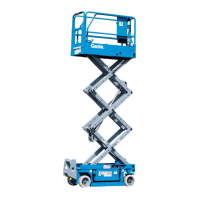



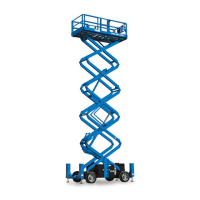
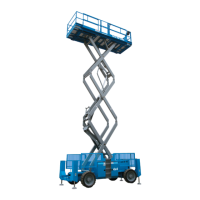
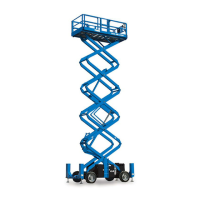

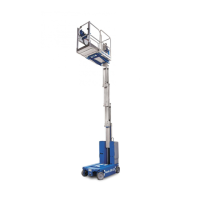
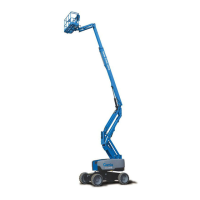
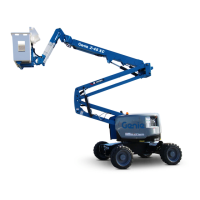
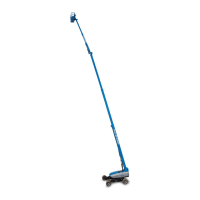
